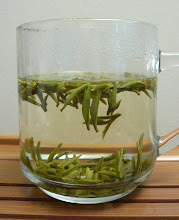 (Other discussions on Long Jing are here.)
(Other discussions on Long Jing are here.) When I bought Long Jing this year, my friend in Long Jing Village send me a small pack of "Long Jing debris" (sifted broken pieces and older leaves) as gift. I appreciate this gift very much, for a few reasons.
First, the gifting culture in China has a lot of subtleties. Usually, expensive, delicate gifts symbolize great respect. But sometimes, casual, inexpensive gifts indicate very close friendship. Every time I get a gift like this Long Jing debris, the Da Hong Pao teabag, and the "granny tea", I feel glad that I'm not just seen as a client, but a friend.
That being said, for those of you who would send gifts to some Chinese in the future, don't take my words about casual gifts too seriously. Follow your heart, and when you are not sure, choose relatively formal gifts :-p Chinese society is full of these subtle manners. Another subtle culture is about paying restaurant bills. I've educated my husband (who is a Chinese Canadian yet "not Chinese enough") about when to pay the bill and when to let others pay the bill, using numerous examples, analogies and historical stories. Sometimes, paying the bill is a big sign of respect, but sometimes allowing somebody else to pay it is a big sign of respect. The opposite of the "big sign of respect" could lead to very bad outcome! After all these years, he hasn't got it yet :-p and often take the wrong choice! But people like him anyway :-)

Secondly, the Long Jing debris tastes good. I know a Long Jing lover who visits the villages in the central producing region every year around Qingming (Qingming is April 4 or 5) for tea shopping. He is a very savvy buyer and always looks for the best quality/price ratio. Once he told me that sometimes he would ask the farmers to sell him the Long Jing debris the farmers take as daily drink, because it's for sure authentic, inexpensive and tasty.

The Long Jing debris doesn't taste as mellow and smooth as a normal Long Jing product. The flavor is a little inconsistent with a mix of grassy, sweet, floral and nutty tastes. But after all, the debris of a good Long Jing is way better than a mediocre tea. I used a little strainer over a tea bowl to brew it, and it went for 2-3 infusions, and I could go for more!

Thirdly, it's quite interesting to peep into the Long Jing debris and see what's there. Actually, it could tell a lot about the tea!
Taking a close look at this dish, we could see some broken pieces, some "yellow/brown/red flakes", some "fluff balls" (by the way, I would like to discuss more about fluff balls later. Meantime,here is an interesting and lengthy discussion on teachat that's dedicated to those "fluff balls")... and, there are quite a few small whole leaves and buds! The leaves and buds are part of the reason why the savvy Long Jing shopper says tea debris is a good deal. When the Long Jing product is sifted at the end of the processing, the sifting method tend to throw out smaller and lighter pieces. Therefore, there are always some "escaped" leaf buds.
Then I picked out a few "representatives" of each type of things in this pile, including: some tea crumbs, some broken leaves, some normal-to-small leaf buds, some tiny small buds, and some "fluff balls". Long Jing's harvest season is very short. Traditionally, summer and autumn harvest yielded cheaper teas. Nowadays, due to the high operational costs, farmers in the central production regions of Xi Hu Long Jing no longer make summer or autumn teas. All the harvest and production happens between the end of March and the near the end of April - this is also why when tourists visit Long Jing region in other months, they should be cautious about their tea purchase, as most farmers (actually all of those I know) no longer have any new tea for sale after early May.
 Within this short time period, tea changes a lot. Therefore, there is the old saying in Long Jing region (and some other green tea regions as well), "It takes 3 days for treasures to turn into grasses." On the young leaves and buds in this photo, we can see some fish leaves (such as on the one at lower left) - the one or two small, undeveloped, nonfunctional leaves at the bottom of the leaf stem. Not all spring tea harvests keep the fish leaves, and some fish leaves are broken off in the tea processing. But when you see fish leaves, they indicate first harvest of the spring. In mid- to late-April harvest of Long Jing, fish leaves wouldn't be seen, neither in the debris or in the regular products. Similarly, the little "fluff balls" are tiny leaf hairs accumulated in tea processing. The tea leaves are rich of tiny hairs in early spring. Harvest of a few weeks later will not have so many leaf hairs. In Long Jing processing, these little fluff balls are sifted out in the last stage, but usually there are still small amount left in the tea. If a Long Jing doesn't have any single one fluff ball, there are two possibilities, (1) the tea is from the very top layer of a batch, as the fluff balls and any crumbs tend to "precipitate" to the bottom of a container; (2) the tea doesn't have many tiny hairs to give rise to fluff balls, and this has to do with either the tea cultivar, or the harvest date. There is a small chance of the third possibility which I would like to discuss later in a "fluff ball" post.
Within this short time period, tea changes a lot. Therefore, there is the old saying in Long Jing region (and some other green tea regions as well), "It takes 3 days for treasures to turn into grasses." On the young leaves and buds in this photo, we can see some fish leaves (such as on the one at lower left) - the one or two small, undeveloped, nonfunctional leaves at the bottom of the leaf stem. Not all spring tea harvests keep the fish leaves, and some fish leaves are broken off in the tea processing. But when you see fish leaves, they indicate first harvest of the spring. In mid- to late-April harvest of Long Jing, fish leaves wouldn't be seen, neither in the debris or in the regular products. Similarly, the little "fluff balls" are tiny leaf hairs accumulated in tea processing. The tea leaves are rich of tiny hairs in early spring. Harvest of a few weeks later will not have so many leaf hairs. In Long Jing processing, these little fluff balls are sifted out in the last stage, but usually there are still small amount left in the tea. If a Long Jing doesn't have any single one fluff ball, there are two possibilities, (1) the tea is from the very top layer of a batch, as the fluff balls and any crumbs tend to "precipitate" to the bottom of a container; (2) the tea doesn't have many tiny hairs to give rise to fluff balls, and this has to do with either the tea cultivar, or the harvest date. There is a small chance of the third possibility which I would like to discuss later in a "fluff ball" post. Farmers from various tea regions have told me that they take sifted broken leaves, tea debris, "yellow flakes", or "granny tea" as daily drink. More or less, it's because the farmers are very thrifty. If a tea can be sold for a lot of money, they would see it as a terrible waste if they drink it themselves instead of selling it. Sometimes the head of the household (usually the old father) simply forbids family members from taking any high grade tea as daily drink. However, this life style is changing as farmers' living standards improves. One farmer once said to me, "We are farmers of the 'new society' of 21st century. Why live a miserable life when you could have a better one?" But even not for being thrifty, many tea farmers and even tea dealers drink all kinds of "debris" and "yellow flakes". It's because those broken leaves are all good stuff. Besides drinking them up, what can you do with them otherwise? It's a sin to throw them away, and don't ever expect teabag manufacturers would care to collect these "deluxe" types of debris ;-)





























5 comments:
Nice story thanks! I like the 'fluff balls' in Long Jing :)
Wonderful post, Gingko. Tea does not have to be pretty to be great. I'd take a fluff ball over a cigarette butt any day! I could probably make a wig out of the human hairs I have pried from bing cha.
I could use a lesson or two about restaurant bill etiquette. I found that to be the most difficult part of a visit to China and Taiwan. On a couple of occasions it was obvious that it was appropriate for us to allow ourselves to be hosted, but for the most part I was at a loss as to how to handle restaurant tabs. There were some very awkward struggles far surpassing the "wallet wars" that commonly occur among friends in the States.
Yes indeed, what a great post! Puff balls in tea? Who knew?!
I am looking forward to reading your "fluff ball" post.
Great pictures too, as always. : )
Thanks guys! I like the "fluff balls", as long as they don't get too many or too fuzzy :-p
Israel, it's quite hard to get exactly when to pay and when to let others pay. But I would say, it's 100 times harder to fight against a bunch of other people for the bill :-p I guess the scene could be even scary to someone who didn't experience it before. Sometimes I just gave up because I thought it was too embarrassing wrestling with other people in a restaurant. For a few times, I paid the bill on my way to the restroom or when my friend went to the restroom. But once a friend got really furious that I paid the bill behind her back. So I feel it's a forever battle and there is no way to win every time. But sometimes I would give the host a gift afterwards to compensate for the loss of bill payment battle :-)
Post a Comment